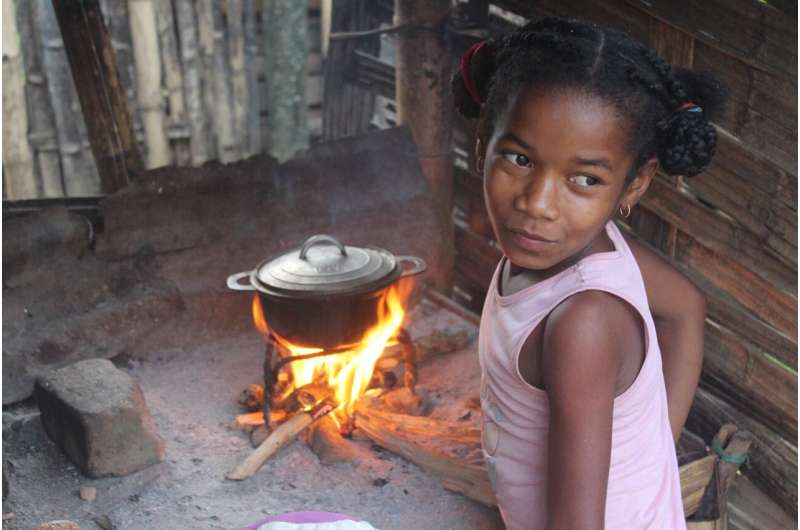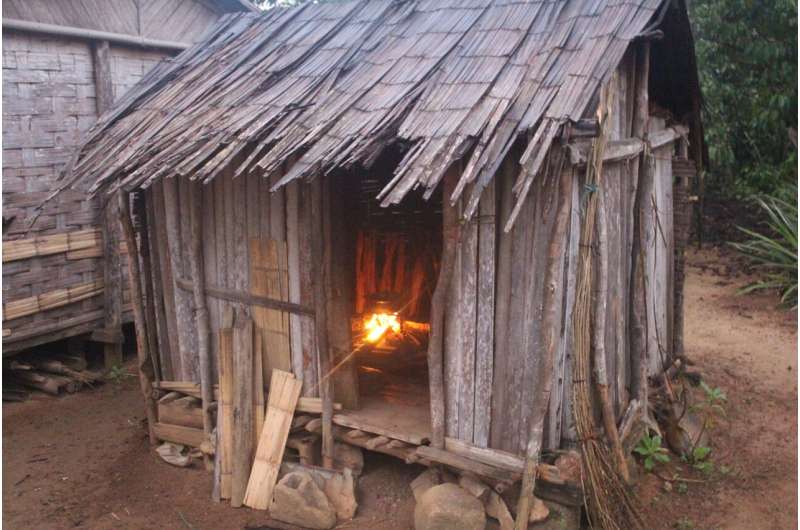Abandoning wood cook stoves would be great for Africa, if families could afford it

Replacing traditional biomass-burning cookstoves across sub-Saharan Africa could save more than 463,000 lives and US $66 billion in health costs annually, according to a new analysis of the most socially optimal cooking technologies in Africa.
But the promise of those outcomes alone may not be enough to hasten the adoption of cleaner alternatives, the researchers warn.
The study, published in the open source journal Nature Sustainability, used a geospatial model to determine the best cooking options by location across the continent, weighing factors such as availability and cost of fuel, time spent gathering fuels and preparing meals, and impacts on health and the environment. In the model, everyone using a traditional cookstove—around 83 percent of households in sub-Saharan Africa, comprising nearly 1 billion people—would switch to stoves that delivered more benefits to both households and society.
“From both a social perspective and a private perspective, it would be optimal for most of these households to use cleaner technologies,” says Marc Jeuland, Ph.D., an associate professor of global health and public policy at Duke who led the research. “And so that’s telling you that these polluting technologies are extremely damaging.”
Traditional stoves typically burn wood or other solid fuels, generating indoor air pollution and climate-altering emissions. Cooking regularly on such stoves can cause respiratory disease, as well as contribute to global warming and deforestation. Stoves fueled by electricity or even liquid petroleum gas (LPG) mitigate those risks while also offering efficiencies in time and labor. Many African households using traditional stoves spend more than an hour a day gathering fuel to prepare meals, Jeuland notes.
Despite those advantages, adoption of cleaner alternatives has been sluggish in Africa, which has lagged other regions in the transition away from polluting cooking technologies. In fact, according to the World Bank’s 2022 Energy Progress Report, the number of people using biomass-burning cookstoves actually increased by 50 percent between 2000 and 2020, as population growth outpaced conversion.
Jeuland and colleagues describe the situation as a “severe market failure” that calls for new policies and incentives to stimulate growth of cleaner technologies.
“Just because something may be beneficial from a social or private perspective doesn’t necessarily mean it’s affordable,” Jeuland says. The up-front cost of purchasing a new stove and ongoing fuel costs “are going to continue to be a barrier for many households in sub-Saharan Africa unless you really reduce those costs through subsidies of some form.”

Jeuland favors subsidies that would reduce the cost of conversion for most families to “close to zero.” He also believes wealthy nations should help foot the bill, since a wide-scale shift to cleaner cooking technologies would lessen a climate problem that those countries bear the most responsibility for creating.
“If rural Africans continue to harvest firewood for cooking, the contribution to climate change is pretty minimal. But because those damages are accumulating, the rich world should be paying to avoid them,” Jeuland says.
But affordability is not the only obstacle. Many parts of Africa do not have reliable electricity or infrastructure to deliver gas for LPG stoves, Jeuland says. The researchers’ model, designed by a team of energy systems engineers at the KTH Royal Institute of Technology in Sweden, accounted for regional infrastructure differences, picking the technology best suited for each location’s unique circumstances.
In the model selecting for the highest net benefits, about two-thirds of households across sub-Saharan Africa would be best off using LPG stoves, with another 30 percent, mostly in urban areas where grid power is available, using electric. Smaller populations in the poorest and most remote locations would use biogas or improved biomass stoves, which burn more cleanly than traditional cookstoves. Even when factoring only benefits to the household, the model suggests eight in ten people in sub-Saharan Africa should switch to cleaner technologies.
The results can help governments and nonprofits target their efforts to encourage conversion, Jeuland says. Doing more to inform people about the potential benefits of switching and developing technologies that are well-suited to local cultures and customs will also be critical, he adds.
But one other area Jeuland would like to explore is how to influence who is at the table when household cooking preferences are discussed. In traditional societies where women and children are exerting most of the cooking labor, men still often make most of the financial decisions.
“Women tend to not have as much bargaining power, and their preferences are down-weighted in these households,” Jeuland says. “And so we need to be thinking about how to empower women in these decisions.”
More information:
Babak Khavari et al, A geospatial approach to understanding clean cooking challenges in sub-Saharan Africa, Nature Sustainability (2023). DOI: 10.1038/s41893-022-01039-8
Citation:
Abandoning wood cook stoves would be great for Africa, if families could afford it (2023, February 3)
retrieved 3 February 2023
from https://techxplore.com/news/2023-02-abandoning-wood-cook-stoves-great.html
This document is subject to copyright. Apart from any fair dealing for the purpose of private study or research, no
part may be reproduced without the written permission. The content is provided for information purposes only.
For all the latest Technology News Click Here
For the latest news and updates, follow us on Google News.
